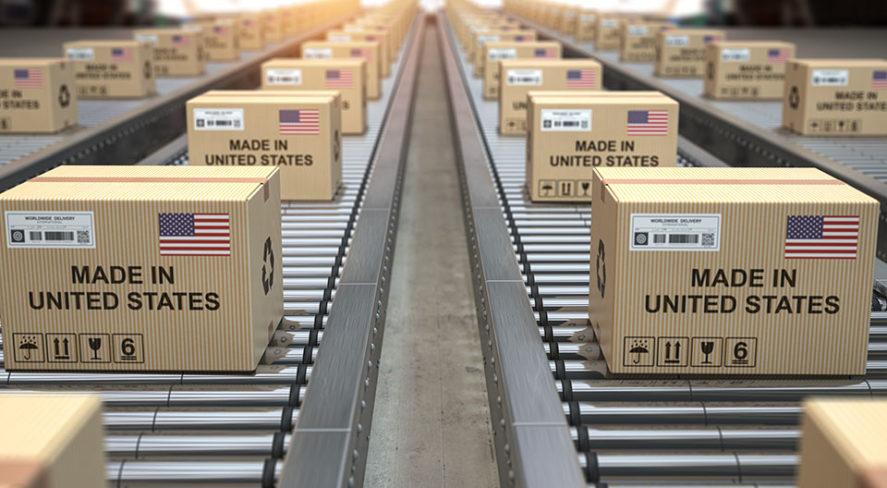What the Buy American Rule Changes Could Mean for the Security Industry

The second major change to Buy American rules within the past year is now under consideration by the federal government. The last major rule, finalized in January, implemented changes proposed under an executive order by the Trump administration, including, among other provisions, the removal of an exemption for commercial items if they contain more than 50% iron or steel components (by cost).
The new proposed rule, released at the end of July, specifically addresses Section 8 of President Biden’s subsequent Executive Order on Ensuring the Future Is Made in All of America by All of America’s Workers by amending the Federal Acquisition Regulation (FAR) to further alter implementation of the Buy American Act (BAA).
The proposed rule responds to directives in Section 8 of the executive order, specifically to “increase the numerical threshold for domestic content requirements for end products and construction materials” and “increase the price preferences for domestic end products and domestic construction materials.” However, in this rulemaking, the FAR Council declined to address Section 8’s call to replace the “component test” in Part 25 of the FAR with a “value-added” type calculation, where, instead of components, domestic content would be measured by “the value that is added to the product through U.S.-based production or U.S. job-supporting economic activity.”
Changes to the FAR
The proposed rule would:
- Phase in an increase to the domestic content threshold (the domestic content percentage required for a product or construction material to be considered “domestic”) from the current 55% to 75% beginning in 2029.
- Apply an enhanced price preference specifically for domestic products considered “critical” or made up of “critical components” and create a post-award domestic content reporting requirement for contractors supplying these items. Importantly, while the rule sets up the related contracting mechanisms, it does not define “critical” or propose how such items are to be identified, which will be the subject of future rulemaking.
Additional Questions
In addition to feedback on the changes to the FAR in the proposed rule, the FAR Council requested public feedback on additional questions related to other provisions of the executive order and other policies related to implementation of the Buy American Act, including the continued relevance of the waivers of BAA requirements for commercially available off-the-shelf (COTS) items, including commercial information technology, and for procurements above the Trade Agreements Act (TAA) threshold. Note that the proposed rule would not change these policies but requests feedback on their implementation and continued importance to federal suppliers.
Implications for the Security Industry
Any significant change to BAA implementation can disrupt the federal supplier base and potentially reduce the competitiveness of offerings from suppliers that manufacture their products in the United States to meet both BAA and TAA requirements, and negatively impact U.S. employment. Ensuring that supply chain elements are aligned for compliance – including product testing, production planning building a domestic workforce and negotiating contracts with suppliers – can take years for contractors to establish.
Additionally, under the rule’s phase in schedule, whether an item is considered domestic could depend on the time it is delivered or installed. This could be problematic, particularly for multiyear contracts. An offeror may have a contract awarded under one content percentage and be required to deliver under a different one, presenting an extensive administrative burden to track compliance through lower tiers, considering subcontractors and suppliers, particularly under construction type contracts.
Regarding the questions posed on COTS, COTS information technology and TAA exemptions, any significant changes to these policies would have a significant impact on sectors like the security industry that are heavily reliant on the global supply chain for electronics. Being able to access the top human talent, the highest-quality materials and the latest technologies available worldwide is especially important for products designed to protect life and safety, where manufacturer component purchasing decisions should be driven primarily by reliability and performance to ensure use of the most effective components for fire alarm, fire suppression, access control, intrusion detection, video surveillance, emergency communications and other functions.
Additionally, our trade agreements provide U.S. companies with nondiscriminatory access to government markets around the world, which, combined at more than $4 trillion, is eight times the size of the U.S. market. TAA countries with reciprocal market access include key allies in Europe, Asia and elsewhere with companies that provide products and technology critical to our national and homeland security, which often have significant U.S. facilities and employees. Close linkage of procurement policies also provides a continuing opportunity to strengthen global supply chain security.
SIA Comment
SIA submitted comments on the FAR changes and questions in the proposed rule, outlining key concerns expressed by SIA members regarding potential impact on the security industry.
Opportunity for Public Comment
Security industry firms that wish to offer individual feedback on the FAR changes and questions posed in the proposed rule can provide comments through Thursday, Oct. 28.
